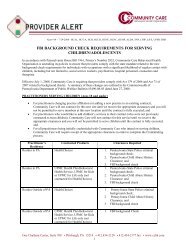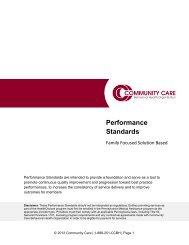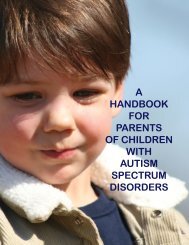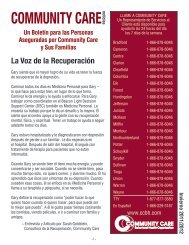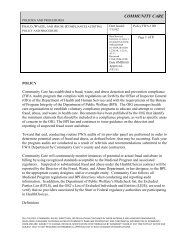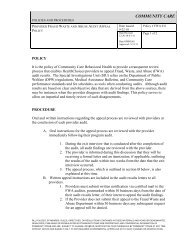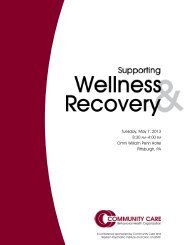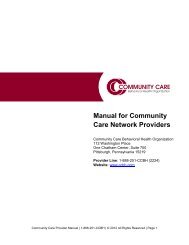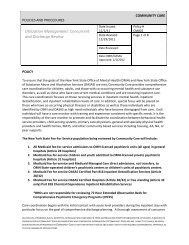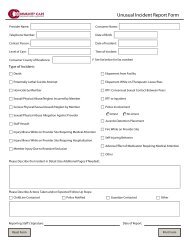Psychiatric Rehabilitation Clubhouse - Community Care Behavioral ...
Psychiatric Rehabilitation Clubhouse - Community Care Behavioral ...
Psychiatric Rehabilitation Clubhouse - Community Care Behavioral ...
Create successful ePaper yourself
Turn your PDF publications into a flip-book with our unique Google optimized e-Paper software.
Performance<br />
Standards<br />
<strong>Psychiatric</strong> <strong>Rehabilitation</strong> <strong>Clubhouse</strong><br />
Performance Standards are intended to provide a foundation and serve as a tool to<br />
promote continuous quality improvement and progression toward best practice<br />
performances, to increase the consistency of service delivery and to improve<br />
outcomes for members<br />
Disclaimer: These Performance Standards should not be interpreted as regulations. Entities providing services as<br />
part of the HealthChoices program must first be enrolled in the Pennsylvania Medical Assistance program as the<br />
appropriate provider type. Providers must then comply with all applicable Pennsylvania laws, including Title 55,<br />
General Provisions 1101, licensing program requirements and any contractual agreements made with <strong>Community</strong><br />
<strong>Care</strong> <strong>Behavioral</strong> Health Organization in order to be eligible for payment for services.<br />
© 2012 <strong>Community</strong> <strong>Care</strong> | 1-888-251-CCBH | Page 1
PSYCHIATRIC REHABILITATION - CLUBHOUSE MODEL<br />
PERFORMANCE STANDARDS<br />
These performance standards are the result of a series of meetings and discussions<br />
facilitated by <strong>Community</strong> <strong>Care</strong>, with representation from network psychiatric<br />
rehabilitation clubhouse providers, county representatives, representatives from<br />
oversight entities, and persons who receive psychiatric rehabilitation services. These<br />
standards are intended to clearly articulate <strong>Community</strong> <strong>Care</strong>’s expectations of<br />
contracted clubhouse providers and define the parameters of reasonable standards of<br />
practice for the provision of psychiatric rehabilitation services which follow the<br />
clubhouse model. The standards incorporate key principles from the practice standards<br />
developed by Boston University and the International Center for <strong>Clubhouse</strong><br />
Development (ICCD).<br />
The standards are intended to provide a foundation and serve as a tool to promote<br />
continuous quality improvement, facilitate progression toward evidence based and<br />
promising practices and to increase the consistency of psychiatric rehabilitation<br />
clubhouse service delivery. Providers are expected to monitor adherence to the<br />
standards and to take actions where indicated to comply with the standards. Programs<br />
using the clubhouse model of psychiatric rehabilitation are expected to follow the<br />
standards developed by the ICCD and to be certified by the ICCD within two years of<br />
start-up. The ICCD standards can be accessed by visiting the ICCD website at<br />
www.iccd.org.<br />
GENERAL DESCRIPTION OF PSYCHIATRIC REHABILITATION<br />
<strong>Psychiatric</strong> rehabilitation services assist persons18 years or older with functional<br />
impairments resulting from mental illness to develop, enhance, and/or retain psychiatric<br />
stability, social competencies, personal adjustment, work related skills, and/or<br />
independent living competencies so that they experience more success and satisfaction<br />
in the environments of their choice and can function as independently as possible.<br />
<strong>Psychiatric</strong> rehabilitation services are designed to address the needs of individuals with<br />
a history of severe mental illness as evidenced by a diagnosis of schizophrenia, major<br />
mood disorder, psychotic disorder not otherwise specified, schizoaffective disorder, or<br />
borderline personality disorder of the DSM IV classification. The person receiving<br />
services must also have a moderate to severe functional impairment as a result of<br />
mental illness and be agreeable to participation in a psychiatric rehabilitation program.<br />
BRIEF DESCRIPTION OF CLUBHOUSE MODEL<br />
The ICCD defines a clubhouse as “a community intentionally organized to support<br />
individuals living with the effects of mental illness Through participation in a clubhouse<br />
people are given the opportunities to rejoin the worlds of friendships, family, important<br />
work, employment, education, and to access the services and supports they may<br />
individually need. A clubhouse is a restorative environment for people who have had<br />
© 2012 <strong>Community</strong> <strong>Care</strong> | 1-888-251-CCBH | Page 2
their lives drastically disrupted, and need the support of others who believe that<br />
recovery from mental illness is possible for all."<br />
<strong>Clubhouse</strong> programs under the ICCD standards include the work ordered day,<br />
transitional employment, and social programming. <strong>Clubhouse</strong>s welcome members into<br />
these activities which support them in achieving success in living, learning, working, and<br />
social roles in the community.<br />
The practice of psychiatric rehabilitation within the clubhouse model is composed of the<br />
following strategies:<br />
• Supporting the member in establishing engagement and rehabilitation readiness –<br />
the self-awareness, confidence, hope, and motivation necessary to actively<br />
participate in the rehabilitation change process.<br />
• Providing the member with the opportunities to join or rejoin the worlds of meaningful<br />
work, friendships, employment, and education, and to access other needed services<br />
within the broader community.<br />
• Supporting the member in establishing or identifying goals related to specific living,<br />
learning, working, or socializing community environmental roles<br />
• Supporting the member in planning strategies and in acquiring the necessary skills<br />
and resources to reach and keep his/her desired goals.<br />
• Supporting the member in developing the necessary supports to maintain those<br />
goals and valued roles.<br />
<strong>Clubhouse</strong> services are provided within a continuum of care, inclusive of treatment,<br />
recreational, social, vocational, educational, natural supports, and other services.<br />
<strong>Clubhouse</strong> programs are founded on the principles of choice and the active involvement<br />
of persons served (within <strong>Clubhouse</strong>s, always referred to as “members”) in their<br />
rehabilitation. <strong>Clubhouse</strong> service planning is intended to be directed by the member and<br />
oriented to the individual’s strengths, service needs, and goals. The clubhouse model<br />
provides a framework for service delivery that clearly reflects these goals. Key elements<br />
include effective participation by the member in planning, delivery, and direction of<br />
services, along with a focus on recovery and accessing self-help resources that are<br />
available.<br />
The clubhouse model requires that a member be actively involved in the design,<br />
development and management of his/her overall rehabilitation, including planned<br />
intervention activities and overall service plans. With the assistance of staff, the member<br />
who is effectively involved in clubhouse programs should be able to articulate his/her<br />
individual goals and objectives (although not necessarily in “professional” terms) and to<br />
identify ways in which his/her current activities are intended to assist him/her in<br />
achieving those goals and objectives and further his/her own recovery. When useful,<br />
community based resources should be incorporated into the collaborative service<br />
planning and implementation approach with the member. All services are to be<br />
delivered in a manner consistent with the principles of recovery.<br />
© 2012 <strong>Community</strong> <strong>Care</strong> | 1-888-251-CCBH | Page 3
<strong>Clubhouse</strong> programs are expected to be structured around the key elements of the<br />
clubhouse model, including the work ordered day, transitional and supported<br />
employment, and evening and weekend program. The ICCD has established 36<br />
standards of operation and guiding principles to which all certified clubhouses must<br />
adhere.<br />
<strong>Clubhouse</strong>s are expected to continually assess the member’s needs and resources and<br />
to guide him/her to use the program in a manner that addresses the member’s<br />
rehabilitation goals. As part of the quality management program, satisfaction with<br />
services and progress toward individualized goals and functional outcomes is<br />
continually assessed by the member and staff together.<br />
SETTING<br />
Consistent with the ICCD standards, the clubhouse has its own identity, including its<br />
own name, address, and telephone number and is located in its own physical space.<br />
The ICCD standards require that the clubhouse is separate from any mental health<br />
center of institutional settings, and is impermeable to other programs. The clubhouse is<br />
to be designed to facilitate the work ordered day and be attractive, adequate in size,<br />
and convey a sense of respect and dignity.<br />
PROGRAM SPECIFICATIONS FOR CLUBHOUSE SERVICES<br />
<strong>Clubhouse</strong> programs are expected to adhere to the standards issued by the ICCD and<br />
to achieve and maintain certification by the ICCD.<br />
<strong>Clubhouse</strong> programs should have demonstrated competence in the identification of and<br />
attention to substance abuse as well as mental health issues. Activities such as NA/AA<br />
meetings are adjunctive to the psychiatric rehabilitation process for some people<br />
participating in a psychiatric rehabilitation program. However, they are not in and of<br />
themselves psychiatric rehabilitation activities.<br />
<strong>Clubhouse</strong> model providers are expected to serve as change agents to help other<br />
service providers, members and potential members, and other stakeholders to be more<br />
aware of the rehabilitation process. They are also expected to promote the inclusion of<br />
interventions throughout the service delivery system that supports individuals with<br />
serious mental illness to work toward readiness to engage in a rehabilitative process.<br />
DOCUMENTATION EXPECTATIONS<br />
An initial planning process must begin upon the first day of attendance. An<br />
individualized, rehabilitation assessment and plan for site based services must be<br />
developed by the 20th day of attendance, not to exceed two months from the initial date<br />
of attendance. The plan can be revised subsequently as appropriate to meet the goals<br />
of the member. The plan must be comprehensive, must be in written form, completed<br />
© 2012 <strong>Community</strong> <strong>Care</strong> | 1-888-251-CCBH | Page 4
with the member present, and include means of integrating the psychiatric rehabilitation<br />
goals with the goals of treatment and other community support services.<br />
<strong>Psychiatric</strong> rehabilitation plans must be reviewed monthly with each member, revised in<br />
partnership with the member at least every three calendar months, and allow for full<br />
input and assessment of progress by the member. This process will assist individuals in<br />
processing their feelings on their progress toward their own individual goals. The<br />
process should also guarantee the involvement of the member in writing his/her<br />
individual goals.<br />
The plan should incorporate specific objectives that are suggested and/or endorsed by<br />
the member as relevant to his/her life goals. Each objective should include a standard of<br />
observable measurement that will form the basis of review by the member and the<br />
program. Plans should reflect the individual’s stage within the psychiatric rehabilitation<br />
process. Goals and objectives should therefore relate to one of the following psychiatric<br />
rehabilitation stages:<br />
• Engagement or rehabilitation readiness development.<br />
• Choosing rehabilitation goal(s) that can be categorized within one or more of the four<br />
domains.<br />
• Developing skills and supports to achieve an environmentally specific rehabilitation<br />
goal.<br />
• Maintaining a valued educational, social, vocational, or residential role. These roles<br />
may be evidenced by action taken either in the larger community or within the walls of<br />
the clubhouse.<br />
The plan should be completed in partnership with the member through active<br />
participation and review of his/her individual progress, and co-signed by the member,<br />
indicating his/her agreement. The value of the process of discussing and including the<br />
individual’s perspective on progress toward goals cannot be overstated.<br />
The rehabilitation plan should also incorporate the individual’s wishes regarding<br />
treatment (Advance Directives, Wellness and Recovery Action Plans (WRAPs), or other<br />
crisis relapse prevention plans) during periods of increased psychiatric symptomatology<br />
when relevant and when the individual agrees that this is of importance. Advance<br />
Directives or WRAPs can be referred to and supported by rehabilitation plans.<br />
Documentation for clubhouse programming must include progress notes that are written<br />
after every day and must include duration and, to the extent possible, relate directly to<br />
the action steps outlined in the goal plan. It is important to note however, that ICCD<br />
standards mandate “members choose the way they utilize the clubhouse, and the staff<br />
with whom they work. There are no agreements, contracts, schedules, or rules intended<br />
to enforce participation of members.”<br />
In the clubhouse model member participation in the full spectrum of activities that are<br />
part of the work ordered day is regarded as an essential element of the rehabilitation<br />
process. The work ordered day is structured to respond flexibly to the needs of the<br />
© 2012 <strong>Community</strong> <strong>Care</strong> | 1-888-251-CCBH | Page 5
clubhouse as a whole as well as to the individual member. Therefore, the member<br />
driven participation in any activity of the work ordered day is viewed as part of the<br />
rehabilitation process, and this will be reflected in the daily note The ICCD standards<br />
state, “All work in the clubhouse is designed to help members regain self-worth,<br />
purpose, and confidence; it is not intended to be job-specific training.”<br />
Whenever feasible, the member should participate in the regular evaluation of progress,<br />
including participation in the writing of progress (or daily) notes. Providers are expected<br />
to have individuals co-sign each progress note, indicating his/her agreement with the<br />
content thereof. If the individual is unable or unwilling to co-sign or does not find the<br />
process of writing or reviewing daily progress to be beneficial, the provider must<br />
document the reason for not signing, and the note must include documentation of the<br />
provider’s efforts to re-engage the individual in a collaborative service documentation<br />
process. Record keeping must also be consistent with the requirements of the<br />
Pennsylvania Medical Assistance Program. Also, monthly written progress summaries<br />
must reflect the individual’s progress on his/her individual goals, be completed in<br />
partnership with the individual and signed by the individual.<br />
A. <strong>Clubhouse</strong> Program Specifications<br />
Hours of Operation<br />
As indicated in the ICCD standards, clubhouse programs define work ordered day hours<br />
and also offer evening and weekend programming outside the parameters of the work<br />
ordered day.<br />
Staffing Patterns<br />
The ratio of staff to members in clubhouse psychiatric rehabilitation programs must be<br />
based upon the needs of the population served, the program needs, and program<br />
location (urban vs. rural) as well as other factors that may impact ratios.<br />
• Programs must have a minimum of one full-time equivalent staff for every 10<br />
members based on average daily attendance.<br />
• Average daily attendance is computed at least monthly.<br />
• At least one psychiatric rehabilitation worker or specialist must be present at all<br />
times.<br />
• A minimum of 25% of the staff must be a specialist or above.<br />
• It is expected that staff will reflect the cultural diversity of the participant population.<br />
• Trained staff will be available or other accommodations made to address the<br />
language needs of the participants, including signing, Braille, and foreign languages.<br />
© 2012 <strong>Community</strong> <strong>Care</strong> | 1-888-251-CCBH | Page 6
The program director must have one of the following:<br />
• A minimum of a bachelor’s degree and at least three years work experience in direct<br />
mental health services, which must include either 60 hours of psychiatric<br />
rehabilitation training or two years of work experience in psychiatric rehabilitation.<br />
Management or supervisory experience is highly recommended.<br />
• Three years as a psychiatric rehabilitation specialist.<br />
A psychiatric rehabilitation specialist must have one of the following:<br />
• A minimum of a bachelor’s degree and two years of mental health direct care<br />
experience, which must include either 60 hours of psychiatric rehabilitation training<br />
or two years of work experience in psychiatric rehabilitation.<br />
• A minimum of a high school diploma or equivalency and six years of mental health<br />
direct care experience, which must include either 60 hours of psychiatric<br />
rehabilitation training or two years of work experience in psychiatric rehabilitation.<br />
A psychiatric rehabilitation worker must have:<br />
• A minimum of a high school diploma or equivalency and two years of work<br />
experience in human services, which must include one year of mental health direct<br />
care experience or a bachelor’s degree with an academic concentration in an area<br />
relevant to the position.<br />
A psychiatric rehabilitation assistant must have:<br />
• Education or experience as appropriate.<br />
The county/<strong>Community</strong> <strong>Care</strong> may accept accreditation or certification by a nationally<br />
recognized organization as evidence that an individual has met the appropriate staff<br />
qualifications, provided that the certification standards equal or exceed those delineated<br />
above.<br />
At least 25% of all staff within each psychiatric rehabilitation program must be certified<br />
through the US <strong>Psychiatric</strong> <strong>Rehabilitation</strong> Association (USPRA) as psychiatric<br />
rehabilitation practitioners (CPRP).<br />
Criminal history checks are to be completed for all employees of the facility who will<br />
have direct contact with the service recipients. Facilities shall develop and implement<br />
written policies and procedures regarding the action that will be taken based on the<br />
outcome of the criminal history and background checks.<br />
Physical Facility<br />
Adequate space, equipment, and supplies must be provided in order that services can<br />
be provided effectively and efficiently. Program space, equipment, and furnishings must<br />
be separate and distinct from other services within the facility and kept well maintained.<br />
© 2012 <strong>Community</strong> <strong>Care</strong> | 1-888-251-CCBH | Page 7
Access<br />
In addition to compliance with the ICCD standards for facility space, the clubhouse<br />
facility must be readily accessible to the persons it serves and should be an integrated<br />
part of the community(ies) served. Sites should be compliant with the requirements of<br />
Section 504 and with the requirements of the Americans with Disabilities Act (ADA). The<br />
provider’s program service description should include written documentation of the<br />
assessment process undertaken to ensure that facilities used are in compliance with the<br />
ADA and Section 504, and with any other applicable laws, rules, and regulations. The<br />
service description should also identify the means employed to ensure that this<br />
information, and compliance, remains current.<br />
B. Concurrent use of clubhouse in conjunction with other psychiatric<br />
rehabilitation services<br />
Mobile psychiatric rehabilitation and clubhouse services can be provided concurrently<br />
under certain limited circumstances. This would include a person transitioning to a<br />
clubhouse service or from a clubhouse service to mobile service who needs assistance<br />
in the transition, or other specific issues that have been identified as requiring both<br />
services.<br />
The concurrent use of site based and clubhouse services require that the member and<br />
the providers coordinate very closely on the delivery of services. The goals of each<br />
service must be well defined and delineated, and seen as necessary to the overall<br />
specific goals of the member. Both services must ensure attention to and support of the<br />
interventions of each distinct service.<br />
PROCESS SPECIFICATIONS<br />
Admission Criteria<br />
• <strong>Clubhouse</strong> members must be 18 years or older and have a current diagnosis of serious<br />
mental illness (consistent with current DPW policy), based on medical records, including<br />
a diagnosis by a psychiatrist of (but not necessarily limited to) schizophrenia, major<br />
mood disorder, psychotic disorder NOS, schizoaffective disorder, or borderline<br />
personality disorder. If the clubhouse program proposes to serve an individual not<br />
meeting the above diagnostic eligibility criteria, the provider must review the individual’s<br />
clinical profile with <strong>Community</strong> <strong>Care</strong> on an exception basis. A member with co-existing<br />
disorders, e.g., mental retardation, substance abuse disorders, physical disability, or<br />
organic brain dysfunction, are eligible to participate in psychiatric rehabilitation<br />
programs, unless the individual’s limitations related to those conditions are so severe as<br />
to clinically preclude active participation.<br />
• Recipients must also have moderate or severe difficulties in functioning in at least one<br />
of the following domains as a result of their mental illness: vocational, social,<br />
educational, and self-maintenance relative to the person’s ethnic/cultural environment<br />
and the person chooses to participate in the program<br />
© 2012 <strong>Community</strong> <strong>Care</strong> | 1-888-251-CCBH | Page 8
<strong>Clubhouse</strong> programs must conduct a comprehensive assessment with each member of<br />
strengths, skill deficits, and needs relevant to recovery. This assessment must occur at<br />
least quarterly and should coincide with the progress reporting and with permission of<br />
the member, involve the individual and appropriate significant others (including<br />
providers of treatment and other support services). The assessment of individual<br />
strengths and needs and subsequent service plan will be conducted by a psychiatric<br />
rehabilitation specialist or program director, who is also responsible for reviewing the<br />
plan with the member and others as appropriate.<br />
The assessment should indicate that the person has or continues to have difficulties<br />
functioning in at least one of the following life domains:<br />
• Vocational<br />
• Social<br />
• Educational<br />
• <strong>Community</strong> success<br />
The individual will co-sign the assessment and updated plan signifying informed<br />
participation and agreement with the goals and objectives.<br />
Effective and meaningful participation in service planning and delivery is a hallmark of<br />
psychiatric rehabilitation services. Demonstration of these key elements is a critical part<br />
of the functioning of each program.<br />
<strong>Psychiatric</strong> rehabilitation programs must offer services to help individuals develop<br />
rehabilitation readiness – the confidence, hope, and motivation necessary to identify<br />
environmentally specific goals and participation in the rehabilitation change process.<br />
Continued Stay Criteria<br />
<strong>Psychiatric</strong> rehabilitation programs must conduct a comprehensive re-assessment of<br />
individual strengths, needs, and interests at least every three months. Assessment may<br />
be done more frequently if warranted by change in circumstance or in the individual.<br />
The re-assessment should result in a revised service plan developed with the individual.<br />
The re-assessment should indicate that the individual meets one of the following<br />
criteria:<br />
• As a result of the mental illness, there are or continue to be functional impairments<br />
and skill deficits which are effectively addressed in the psychiatric rehabilitation<br />
plan. In the event that earlier efforts have not achieved the intended objectives, the<br />
revised plan indicates service modifications to address these issues.<br />
• There is reasonable expectation that the withdrawal of services may result in loss of<br />
rehabilitation gains or goals attained by the individual.<br />
• A change in program or level of service is indicated and a transition plan is in place<br />
reflecting the proposed change<br />
The person must also choose to continue to participate in the program<br />
© 2012 <strong>Community</strong> <strong>Care</strong> | 1-888-251-CCBH | Page 9
Successive rehabilitation plans must include goals and objectives that address<br />
specifically the identified need(s) in terms of psychiatric rehabilitation services. The<br />
individual will co-sign the re-assessment, signifying informed participation and<br />
agreement with the goals and objectives.<br />
Discharge Criteria*<br />
An individual may be deemed ready for discharge if the individual meets one of the<br />
following criteria:<br />
• The person is not expected to receive additional rehabilitative benefit from the<br />
program and there is a reasonable expectation that the withdrawal of services will<br />
not result in decompensation. Reference should be made to the documentation of<br />
precipitants of symptom exacerbation.<br />
• The person has successfully achieved rehabilitation goals and sustained them for a<br />
period, as designated in the rehabilitation plan, and is in agreement that clubhouse<br />
services are no longer necessary to maintain recovery.<br />
• The recipient voluntarily terminates from the program.<br />
As per the ICCD standards, an individual may be discharged if that person poses a<br />
significant and current threat to the general safety of the clubhouse community and<br />
upon discharge or termination the person is informed of his/her rights and the process<br />
for appeal.<br />
It is expected that some individuals may embark upon a rehabilitative process through<br />
psychiatric rehabilitation services, but reach a point where it is mutually agreed that the<br />
service is not the most appropriate to meeting the individual’s needs at that time. In<br />
such situations, the provider is expected to fully explore other service options with the<br />
individual, including the possibility of social rehabilitation to foster a readiness for<br />
psychiatric rehabilitation.<br />
At the time of discharge or termination, it is expected that, with the member’s desire and<br />
written consent, clubhouse staff will work with the person with primary case<br />
management/coordination responsibilities, the member, significant others, behavioral<br />
health and health care providers, and others involved in providing on-going or needed<br />
services to develop effective linkages.<br />
Adherence to the documentation guidelines is expected to capture the details of the<br />
rehabilitative process to support decision making related to medical necessity<br />
determinations.<br />
*Note: In addition to the criteria outlined above, discharge criteria should also adhere to<br />
ICCD standard that “membership is voluntary and without time limits.” This standard<br />
requires that regardless of current level of functioning, a person may remain an active<br />
member of the clubhouse program for as long as he/she wishes.<br />
© 2012 <strong>Community</strong> <strong>Care</strong> | 1-888-251-CCBH | Page 10
Coordination of <strong>Care</strong><br />
<strong>Clubhouse</strong> programming is offered in a manner distinct from but coordinated with other<br />
mental health programs. <strong>Clubhouse</strong> programs are not to operate in a silo, but rather<br />
foster a high degree of coordination with other behavioral health/ human services and<br />
community/natural supports.<br />
It is expected that an individual involved in a clubhouse program will have access to<br />
case management services and that he/she will, to the extent that the member is willing,<br />
receive medically necessary case management services (Intensive Case Management,<br />
Targeted Case Management, Blended Case Management, Resource Coordination,<br />
Administrative Case Management or through participation with a <strong>Community</strong> Treatment<br />
Team). With the member’s desire and written permission, the clubhouse provider is<br />
expected to participate with case management services and to have communication<br />
with all behavioral health treatment teams (within the scope of applicable laws, rules,<br />
and regulations) for collaboration on coordination of care issues. The provider is also<br />
expected to assist the member in accessing other levels of clinical and supportive<br />
services. The following activities will also be provided according to the needs of the<br />
member: liaison with mutual support networks and advocacy groups, family members,<br />
and member; status reports to clinical treatment teams; and coordination with<br />
educational or vocational programming will also be available.<br />
It is also necessary that the member and the providers serving the member work<br />
together to ensure that services are delivered in as efficient, and least restrictive<br />
manner as possible, avoiding the duplication of like services to the extent possible.<br />
Service Authorization Process<br />
In order to initiate the service precertification process with <strong>Community</strong> <strong>Care</strong>, the<br />
provider is expected to complete a functional assessment with the person to be served.<br />
That same day, the psychiatric rehabilitation clinician is to call <strong>Community</strong> <strong>Care</strong> to<br />
initiate the precertification process. It is acknowledged that the completion of the<br />
functional assessment and the gathering of other supportive clinical information, such<br />
as psychiatric evaluation and diagnostic confirmation may take some time. However,<br />
providers are expected to contact <strong>Community</strong> <strong>Care</strong> as early in the process as is<br />
possible.<br />
The <strong>Community</strong> <strong>Care</strong> care manager reviews the clinical information presented, verifies<br />
that the individual meets the admission criteria and medical necessity, reviews the initial<br />
psychiatric rehabilitation goals for appropriateness, reviews the groups indicated for<br />
relevance to stated goals, and looks for evidence of the long term goal(s) for psychiatric<br />
rehabilitation services. An initial service authorization of 60 days from the date of the<br />
functional assessment is given at the completion of the precertification process.<br />
The first continued stay review is conducted prior to the expiration of the initial<br />
authorization. Providers are expected to complete the telephone review of the<br />
© 2012 <strong>Community</strong> <strong>Care</strong> | 1-888-251-CCBH | Page 11
ehabilitation plan for the individual to conduct the first continuing stay review. The plans<br />
are reviewed to determine if in fact interventions are appropriate to the stated goals, the<br />
functional assessment continues to demonstrate the medical necessity for the services,<br />
and some progress toward goals is being realized. An authorization for up to 90 days is<br />
issued provided the above criteria are met. It is important to note that the clubhouse<br />
model is designed to address goals from all rehabilitation domains identified in the<br />
functional assessment. While the enhancement of work related skills is most evident in<br />
the clubhouse, and therefore frequently is selected as a domain in which a member<br />
establishes goals, he/she may select goals associated with any domain, choosing a<br />
vocational goal or not. The expectation for a vocational goal is reasonable given the role<br />
of work in the clubhouse model and it is important to note that the scope of vocational<br />
goals includes goals related to any meaningful activity within the clubhouse, work within<br />
the clubhouse, or activities related to learning new task oriented skills. Goal plans for<br />
clubhouse participants should be individualized to each participant’s specific situation.<br />
It is expected that when providers request authorization for an individual participating in<br />
the clubhouse, the individual is actively participating in clubhouse psychiatric<br />
rehabilitation services and these services are clearly psychiatric rehabilitation in nature<br />
and not social rehabilitation. Goal plans, the overall rehabilitation goal and progress<br />
notes must clearly support that the individual is working on psychiatric rehabilitation<br />
goals in the clubhouse. All documentation must demonstrate that interventions are<br />
directly related to the goal plan and overall rehabilitation goal. Social rehabilitation<br />
services and activities are not eligible for authorization through <strong>Community</strong> <strong>Care</strong>.<br />
When an individual is discharged from services, the provider is expected to notify<br />
<strong>Community</strong> <strong>Care</strong>’s care manager. The care manager reviews the status of goal<br />
attainment and the linkage to additional services and supports post discharge.<br />
STRUCTURAL SPECIFICATIONS<br />
Provider Qualifications<br />
Providers must be licensed by DPW, OMHSAS to be qualified to render site based or<br />
mobile psychiatric rehabilitation services. For clubhouses, providers are also expected<br />
to have certification through the International Center for <strong>Clubhouse</strong> Development<br />
(ICCD). The provider shall show evidence of the incorporation of psychiatric<br />
rehabilitation principles through the development of an organizational culture committed<br />
to those principles. Such evidence should initially be found through a written statement<br />
defining the mission, vision, and values of the organization. Further specific evidence<br />
should be found in the service description to be reviewed and submitted to <strong>Community</strong><br />
<strong>Care</strong> on an annual basis. Evidence will also be found in the strategic, operational, and<br />
program related materials designed around fundamental psychiatric rehabilitation<br />
principles. Further detail regarding provider qualifications is included in the DPW<br />
standards.<br />
© 2012 <strong>Community</strong> <strong>Care</strong> | 1-888-251-CCBH | Page 12
Staff to client ratios must be adequate to support the activities of the program as defined<br />
by the outlined program description.<br />
Staff Training Requirements<br />
Completion of a 12 hour competency based orientation is required and is provided<br />
through DPW. Staff are expected to have completed this training within one year of the<br />
hire date or program start-up. Staff must complete 18 hours per year in continuing<br />
education in areas directly relevant to psychiatric rehabilitation services required for all<br />
staff in psychiatric rehabilitation programs. The initial 12 hour orientation qualifies for 12<br />
hours of the first year’s training. The provider is expected to maintain accurate records<br />
of all training and education efforts and to ensure that these are in compliance with<br />
DPW, county, and <strong>Community</strong> <strong>Care</strong> standards.<br />
Provider Records<br />
Provider records must include documents verifying employee work schedules, job<br />
descriptions, employee qualifications, and performance reviews as well as the training<br />
protocol and records. Documented policies are to include affirmative action, complaint<br />
and grievance process, and a conflict of interest policy. There must be a description of<br />
services to be provided and a record of daily clubhouse psychiatric rehabilitation units.<br />
Service Records<br />
<strong>Psychiatric</strong> rehabilitation programs must maintain records on each person receiving<br />
services. In addition to referrals and identifying information, an individualized<br />
rehabilitation assessment and plan signed by the participant must be included as well<br />
as documentation that the participant meets the admission and continued stay eligibility<br />
criteria, documentation of coordination of care with health care providers and other<br />
social service agencies, and any required consent forms. Progress notes should be<br />
reflective of the goals established on the service plan, with ongoing reviews. Progress<br />
notes must be legible and signed and dated by the person providing the service and the<br />
participant.<br />
QUALITY MANAGEMENT<br />
Each psychiatric rehabilitation service provider shall have in place a written quality<br />
management (QM) plan document that is reviewed and updated annually to reflect the<br />
effectiveness of internal program processes, overall satisfaction with services, and<br />
outcomes for members. The QM plan must be submitted to <strong>Community</strong> <strong>Care</strong> as part of<br />
the credentialing process. The QM plan should also be submitted with the annual service<br />
description to <strong>Community</strong> <strong>Care</strong>. A copy shall also be submitted to the appropriate County<br />
<strong>Behavioral</strong> Health Office.<br />
© 2012 <strong>Community</strong> <strong>Care</strong> | 1-888-251-CCBH | Page 13
The QM plan should identify at least one measurement in each of the following three<br />
areas - process, satisfaction, and outcomes measurement - to be examined on an<br />
annual basis. Possible targets for measurement and evaluation include:<br />
• Assessment of the on-going effectiveness of the program.<br />
• Degree of input from members into the development of the program.<br />
• Program fidelity to the ICCD standards.<br />
• Means of ensuring the effectiveness of staff and of staff training.<br />
• A process for the effective management of, and response to, complaints of members<br />
and the ability to aggregate complaints to improve program effectiveness.<br />
• Means to assess satisfaction with services from members.<br />
• Assessment of the effectiveness of linkages between behavioral health programs,<br />
housing, employment, and education programs and natural supports.<br />
Each psychiatric rehabilitation service provider shall provide for a systematic review of<br />
services to ensure quality, timeliness, and appropriateness of services. An outcome<br />
evaluation system also needs to be developed to determine program effectiveness,<br />
efficiency, and satisfaction. The outcome evaluation system must be written in a manner<br />
so as to ensure that service goals and objectives of members are incorporated into the<br />
evaluation plan.<br />
OUTCOME MEASUREMENTS<br />
<strong>Psychiatric</strong> rehabilitation programs have been noted to be of significant value to<br />
individuals with serious and persistent mental illness. <strong>Clubhouse</strong> providers are expected<br />
to utilize the outcome measure for psychiatric rehabilitation that was developed<br />
collaboratively by <strong>Community</strong> <strong>Care</strong>, psychiatric rehabilitation providers, Allegheny<br />
County OBH, and Allegheny HealthChoices Inc.<br />
Expected outcomes for psychiatric rehabilitation services include:<br />
• Increased community tenure.<br />
• Reduced psychiatric hospitalization.<br />
• Reduced involvement with criminal justice.<br />
• Decreased use of illicit drugs and/or alcohol abuse.<br />
• Improved satisfaction as assessed by members with:<br />
• <strong>Behavioral</strong> health services received.<br />
• Quality of life.<br />
• Increased active participation in treatment and service planning.<br />
• Improved adherence to agreed-upon services.<br />
• Active self-notation of progress.<br />
• Heightened self-esteem (self-report).<br />
• Improved vocational functioning.<br />
• Improved educational status.<br />
• Improved stability of housing status.<br />
• Improved GAF score<br />
© 2012 <strong>Community</strong> <strong>Care</strong> | 1-888-251-CCBH | Page 14
Providers are expected to capture some subset of the indicators above on a routine<br />
basis to substantiate the aggregate outcomes for the people being served in the program<br />
over time. Providers are expected to work cooperatively with <strong>Community</strong> <strong>Care</strong> when<br />
specific outcome measurement plans are proposed.<br />
© 2012 <strong>Community</strong> <strong>Care</strong> | 1-888-251-CCBH | Page 15



